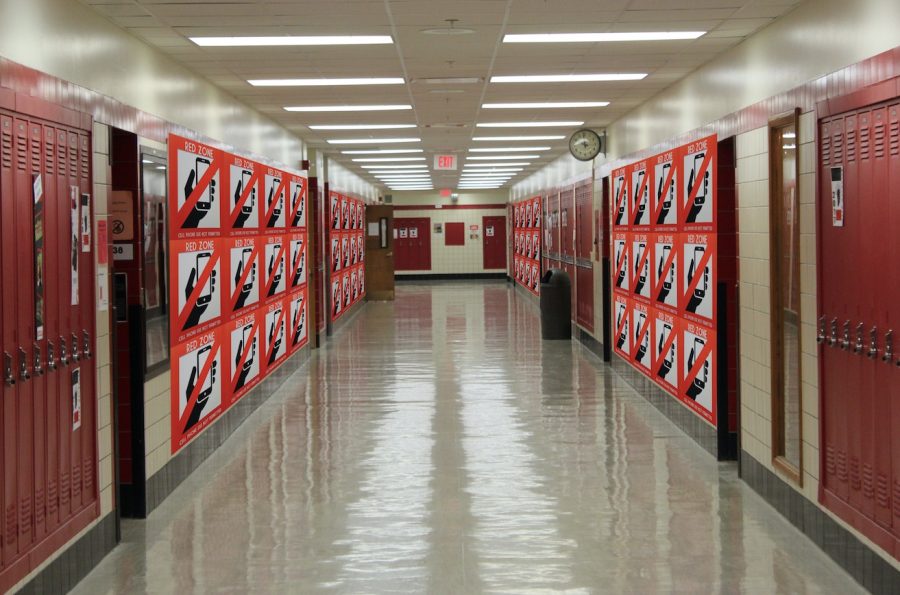By Meg Boedeker |Opinion|
As the 2017-18 school year begins, frustration rings throughout the halls. The first day of the school year presented new policies. The new cell-phone and tardy/attendance policies are an annoyance for many, but are the new rules doing more harm to students than good?
Overall, the line is drawn deeply in the sand between who is on board with the policy, and who is not. Teachers almost unanimously agree that the new policies are a long-awaited benefit to the overall school atmosphere. “I believe this was a policy long overdue at LHS,” Justin Holbein, English and theatre teacher, said.

“If students cannot be responsible for their usage, than it has to be modeled for them or [have] procedures put in place to educate them on proper usage,” Holbein said. In addition, “For my freshmen, a policy that creates clear ‘zones’ of cell phone use is beneficial—the less they have to interpret or ‘read into’ expectations, the better for building positive classroom time,” social studies educator, Nancy Grant-Colson said.
Grant-Colson and Holbein, as well as many other teachers, believe that the new cell-phone policy is a much-needed change to LHS. However, many students disagree with this.
Although some students believe that the new cell-phone policy was much needed in the learning environment, almost all students know that everyone will keep to their old habits, and most likely disregard the policy. These policies don’t change the way that phones are hardwired into our everyday lives.
People are distracted by their phones, and when they don’t have them, they will find other ways to become distracted within the classroom—whether that be spacing off or passing notes to the people around them.
We can’t go without our phones, and having a policy doesn’t mean that people will necessarily follow it, even if the policy is to help to benefit students in the long run. Phones aren’t the only distraction within the classroom, and getting rid of them won’t get rid of distractions.
“I hope, in some ways, that this policy is less confusing for kids, because I think something that unintentionally happened with our previous policy was that some teachers had enforced it more strict than others, and in some ways that was confusing for kids to try and figure out if, ‘Does this teacher let me have it out?,’ ‘Does this teacher not let me have it out?’ ” principal Mark Larson said.
Even though this may be the case for some classrooms, not every classroom is consistent with the policy. For example, “…I feel like they’re [the new policies] pretty clear, except that some teachers say you can’t have technology out in the classroom during passing period and some are okay with it, so it’s unclear if classrooms are red zones at all times or if they are green zones during passing period. Technology has never really been disruptive in my classes, before or after the new policy,” senior Luca Hinrichs said.
Staff and teachers want students to succeed in the world after high school, believe it or not. “And ultimately…this policy is not about us having—adults having power over students. It’s about us making decisions about what we think are best for our kids and their habits long-term, and we’re hoping that they understand that we don’t want you to be distracted by these things because we want you to do your best; because we want you to be successful in your classes and things like that,” Larson said.
Although these policies may be put into place by administrators to help students, when they are not enforced equally and consistently throughout the school, it wears on Lincoln High’s reputation as being a positive school environment. It shows that we are going to give up when students don’t do what we want them to, and that tells that we aren’t as strong and powerful of a school as we think we are.
If we, as a student and staff body, want other schools and students to take us seriously, we mustn’t put rules into place that we cannot enforce. LHS might as well not have the policy at all if we cannot enforce it!
Regarding the new tardy/attendance policies, cannot change old habits—especially the habits of the students who do not seem to care about school or its rules in the first place. Some students just do not want to go to class, and some of the consequences for being out in the hallways or consistently being tardy, to some students, are better than going to class.
Since the tardy and attendance policy was put in place at the start of this year, there’s been a decrease in tardiness and a lower percentage of students with multiple truancies. Even though this data shows positive effects of the policy, some students beg to differ.
Overall, students who care about getting to class on time are bogged down by others who don’t, and the students who want to be at class on time get in trouble (and most of the time, but not all of the time, the students who are tardy/truant because of their own choices get consequences for their own actions).
Teachers, staff, and administrators want students to be successful. Even though the cell-phone policy idea of a “red-zone” may theoretically be a good idea, you cannot dismiss that part of technology from students.
Students will still be distracted within class if they want to be. They will never completely follow the “red-zone.” It’s a virtually impossible goal. You cannot take technology out of a millennial, and a millennial cannot be completely taken out of the technological world.
